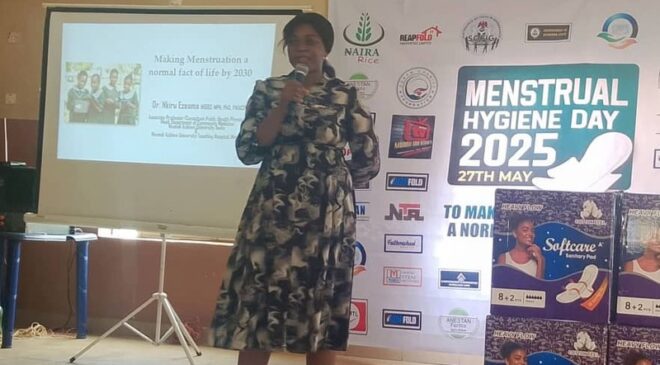
AWKA/Nigeria: A public health physician, Dr. Nkiru Ezeama, has said that menstruation is a natural sign of health and womanhood and should never be seen as a source of shame or disgrace.
Ezeama made this assertion during a symposium for schoolgirls held in Awka on Wednesday to mark the 2025 Menstrual Hygiene Day. The event was organised by ZOBAM Charity Foundation in collaboration with Creative Ladies Global Resources.
Menstrual Hygiene Day is observed globally on May 28 each year to highlight the challenges women and girls face due to lack of access to sanitary products and to raise awareness about menstrual health and hygiene.
The theme of the 2025 observance is “Making Menstruation a Normal Part of Life by 2030.”
Speaking to participants, Ezeama described menstruation as a natural biological process, involving the monthly discharge of blood from the uterus, which begins when a girl reaches puberty.
“Menstruation is a normal part of life that signals womanhood, and over 1.8 billion women and girls menstruate all over the world,” she said. “So, it is nothing to be ashamed of because it is a sign of health and womanhood. A woman who does not see her menstruation should go seek medical help. There is need to normalise menstruation so that girls and women can talk about it freely without shame, to break stigma, silence and cultural taboos.”
Ezeama expressed concern over the global figure of more than 500 million girls and women who lack access to sanitary products, forcing many to rely on unhygienic alternatives that pose serious health risks.
She warned that the use of unclean materials during menstruation can result in discomfort, infections, and long-term reproductive health complications.
“Many girls and women in Nigeria cannot afford sanitary products costing between N1,000 and N2,000 each month due to period poverty,” she said. “This challenge often leads to girls missing school, reduced participation in sports and lower academic performance.”
Dr. Ezeama urged the government to adopt policies that would make sanitary products affordable or free, and to improve menstrual hygiene infrastructure.
“Our government should legislate policy to make it affordable or free in the country as well as provide facilities such as toilets and clean water in schools and public places,” she said. “It is important to incorporate comprehensive menstrual health education into the school curriculum to equip girls with knowledge about puberty, menstrual hygiene, sexuality, and reproductive health.”
In her contribution, Nigeria’s first female professor of Mass Communication, Prof. Stella Okunna, reinforced the message, describing menstruation as a source of pride that marks the beginning of womanhood and motherhood.
Earlier in her address, Mrs. Maureen Okolieukwu, Convener of ZOBAM Charity Foundation, said the initiative was launched in 2018 to help schoolgirls learn how to make reusable menstrual products as a sustainable way to maintain good hygiene.
“As a mother of girls, I understand the monthly cost of sanitary products. That is why I started this programme, to help girls and women save money and practice good menstrual hygiene,” she said.
The symposium also featured a practical workshop on producing reusable sanitary pads and included the distribution of free sanitary products to participating schoolgirls.
